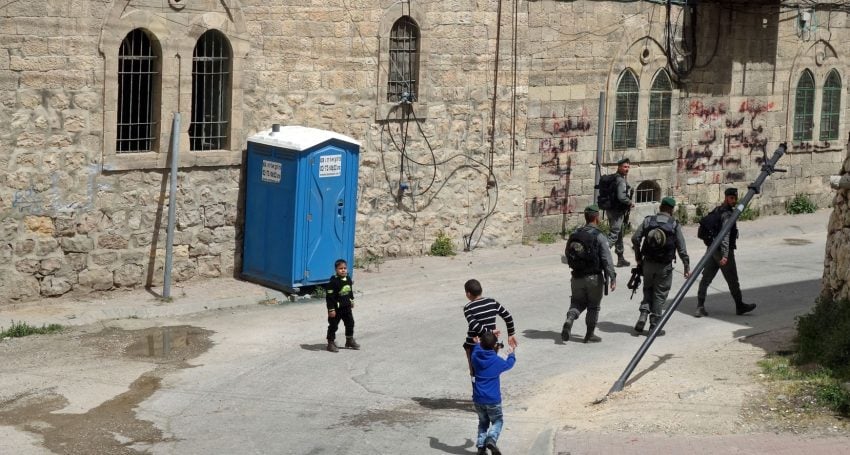When not even home at night is safe for Palestinian children
Features
“My Ecumenical Accompaniment Programme in Palestine and Israel teammates were clearly upset when they came home one night after visiting a family in the West Bank town of Azun. As they debriefed with me, I learnt about the arrest of a 14-year-old Palestinian boy earlier that morning. This was the first time that we heard a firsthand account of Palestinian children being detained by the Israeli military, but sadly this wasn’t the last story that we documented in our roles as Ecumenical Accompaniers,” says Nell Potter from the Palestine Israel Ecumenical Network

My Ecumenical Accompaniment Programme in Palestine and Israel teammates were clearly upset when they came home one night after visiting a family in the West Bank town of Azun. As they debriefed with me, I learnt about the arrest of a 14-year-old Palestinian boy earlier that morning. This was the first time that we heard a firsthand account of Palestinian children being detained by the Israeli military. But sadly, this wasn’t the last story that we documented in our roles as Ecumenical Accompaniers during the three months we spent living as human rights monitors in the Occupied Palestinian Territory in 2017.
On this evening, the team members were invited to meet the boy’s family. They met with the boy’s mother and aunt, who also lived in the house, and later with the father as they were walking in the village. The family members were clearly traumatised. The aunt was present during the arrest and described what happened. She said that Israeli soldiers descended upon their home in a 1am raid. They rounded up the family members into a downstairs room and then proceeded to interrogate the boy upstairs without a lawyer or a parent present. The aunt said that one soldier threatened her with, “If you scream again, I will shoot you.”
The soldiers then took the boy away by force. The family found out that he was detained at Ariel Police Station in the nearby illegal Israel settlement in the occupied West Bank. The father showed my teammates the paper he was given by the Israeli military, informing them that his child would appear before the Israel military court the next day. Unfortunately we were not unable to ascertain what unfolded for this child and his family.
Advertisement
It is all too common to hear stories of innocent Palestinian children being forcibly taken in late-night raids by armed Israeli soldiers. Fifteen to 20 soldiers typically attend a raid. Reports of torture during transfer and detainment are also common, including children being beaten, burnt with cigarettes or denied access to food and water and toilets or held in outdoor cages during the bitter winter months.
The most common charge – if there is one – is for throwing stones, either at armed Israeli soldiers, who antagonise or threaten the children as they play or walk to and from school, or at Israeli tanks.
A number of Palestinian and Israeli human rights organisations focus on the detention of Palestinians and highlight the violations that occur. Military Court Watch is one such organisation, with its website presenting these shocking facts:
- “Children as young as 12 years can be prosecuted in the military courts.
- Approximately 500-1,000 children detained each year.
- Over half of all detained children are arrested at night and report physical and psychological abuse during arrest, transfer and interrogation.
- 95% of cases in the military courts end in conviction.
- Approximately 50% of Palestinian child detainees are held in prisons in Israel in breach of Article 76 of the Fourth Geneva Convention.”
The co-founder of Military Court Watch, Salwa Duaibis, will be a keynote speaker at one of the Lenten Reflections from Palestinian Christians, hosted by the Palestine Israel Ecumenical Network, Sabeel Australia and Palestinian Christians in Australia.
Lenten commemorations may take a number of forms. A common challenge is whether to focus on taking up or giving up. Regardless, it is a time of preparing ourselves, corporately and individually, for Easter, with its themes of death and resurrection.
Advertisement
As a period of reflection, a time of spiritual stocktaking, it is most appropriate that Australian Christians acknowledge the reality of an ongoing situation where children are not safe.
Everyday life in Palestine, where Jesus was born and where he ministered, died and resurrected, is sometimes termed by Christians as a “Lenten season prolonged”, with the hope of journeying towards Easter. If there is a sense of “Easter celebration delayed”, as justice for Palestinian children is delayed, there is hope as people resist dispossession and injustice.
May the voices of our Palestinian brothers and sisters speak compellingly to us this Lenten season. You are invited to hear their voices by taking up an online Lenten Reflection and Q&A series.
The first Lenten reflection and Q&A theme will be “Children in Israeli military detention”, with co-founder of Military Court Watch Salwa Duaibis speaking. The remainder of the Lenten reflections and Q&A sessions in the series will address what it is like for Palestinians living in Israel (with Daniel Munayer speaking) and how young Palestinians here in Australia are navigating their identity and roots (with Jason Damouni and Faten Qunqar speaking).
The Zoom series will close on Palm Sunday eve with a celebratory joint online service as Christians from both Palestine and Australia gather online.
The dates for the reflections are Wednesdays March 16, 23 and 30 between 7.30pm and 8.30pm (AEDT), with the online service held on Saturday 9 April between 7.30pm and 8.30pm. Register online to receive the Zoom links, which will be sent closer to the events.
Editor’s note: The Ecumenical Accompaniment Programme in Palestine and Israel was created by the World Council of Churches in 2002.





